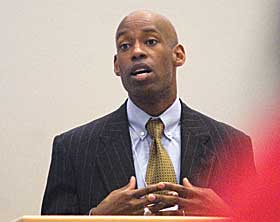  |
| HOME | THIS ISSUE | CALENDAR | GRANTS | BACK ISSUES | < BACK | NEXT > |
Conference examines ingredients for student success in collegeby Sherry Fisher - June 18, 2007 | ||||
| Elementary schools, high schools, colleges, and policy makers will have to work together to ensure that more students make a successful transition from high school to college. That’s the word from Michael Collins, program director at Jobs for the Future, a nonprofit research, consulting, and advocacy organization. “The rigid separations between [these entities] are one of the reasons for the tremendous and disappointing numbers of students who get to college but aren’t successful,” said Collins during his keynote address at a June 5 conference on college readiness and success. The event was sponsored by the First Year Experience and Early College Experience programs, and the Neag School of Education. “We’ve got to get at preparation for college in a very different way than we’ve done in the past,” said Collins. Jobs for the Future is working to find ways to increase college entry and graduation. Trends suggest that students may become ready for college by taking college courses while they are in high school, he said. “I think it’s provocative, because this started out as an option for academically advanced students. But why can’t we do the same for underrepresented populations?” The hypothesis is that a dose of college-level credit might have a positive effect on students who have not traditionally considered college, or students who might be academically unprepared, he said. The Early High School Initiative, sponsored by the Gates Foundation, has the potential to do just that, Collins said. Early College High Schools are small schools where students earn a high school diploma and up to 60 hours of college credit. They help bridge the gap between school and college. There are 130 such schools.
“We’re making our case to people who make decisions about policy,” Collins said. “When they find out that their students can earn college credits while they’re in high school, they’re very excited.” Collins said his group is developing a system to track the students’ progress. Veronica Makowsky, vice provost for undergraduate education and regional campus administration, said the University believes in nurturing the future workforce “in a way that today’s world demands in terms of globalization and diversity. “The University cares deeply about the quality and outcomes of the state’s K-12 educational system,” she added, and is “concerned about the persistent achievement gaps existing in our state.” UConn’s Early College Experience provides opportunities for Connecticut high school students to take UConn courses while still in high school. Rachel Buck, a math teacher at the Connecticut International Baccalaureate Academy, spoke at a workshop on high school models for college success. The Academy “aims to develop inquiring, knowledgeable, and caring young people who help create a better world through intercultural understanding and respect,” she said before the workshop. “It’s not just about academics and passing tests. We’re developing students who are ready for the real world.” |
| ADVANCE HOME UCONN HOME |

